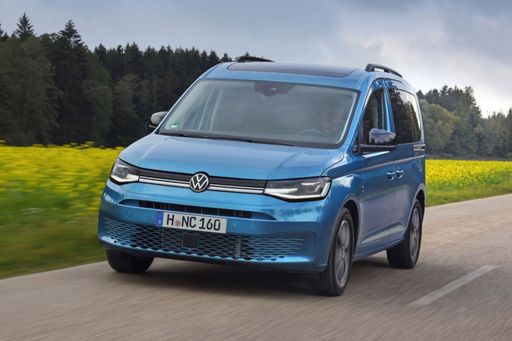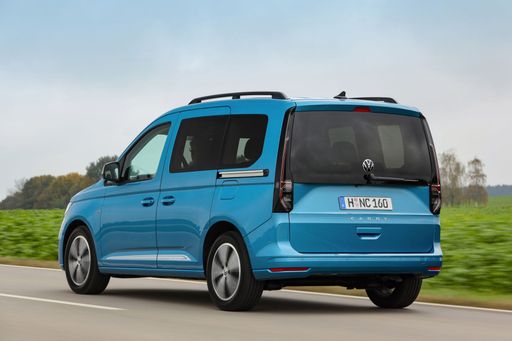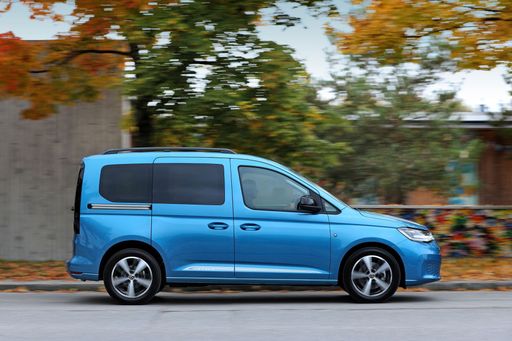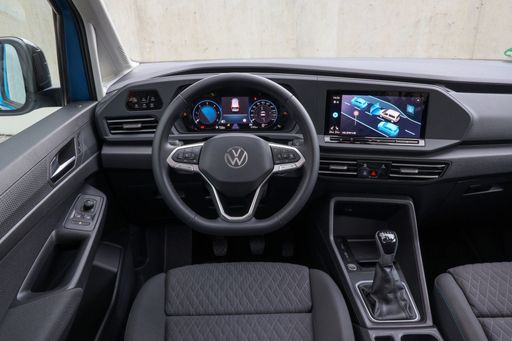VW Caddy Compact Van vs Kia PV5 – Performance, range & efficiency compared
Both models have their strengths – but which one suits you more?
Compare performance, efficiency, price and space directly: VW Caddy Compact Van or Kia PV5?
Costs and Efficiency:
Price and efficiency are key factors when choosing a car – and this is often where the real differences emerge.
VW Caddy Compact Van has a noticeable advantage in terms of price – it starts at 25800 £, while the Kia PV5 costs 32800 £. That’s a price difference of around 6999 £.
As for range, the Kia PV5 performs convincingly better – achieving up to 400 km, about 280 km more than the VW Caddy Compact Van.
Engine and Performance:
Power, torque and acceleration say a lot about how a car feels on the road. This is where you see which model delivers more driving dynamics.
When it comes to engine power, the Kia PV5 has a hardly perceptible edge – offering 163 HP compared to 150 HP. That’s roughly 13 HP more horsepower.
In terms of top speed, the VW Caddy Compact Van performs clearly perceptible better – reaching 186 km/h, while the Kia PV5 tops out at 135 km/h. The difference is around 51 km/h.
There’s also a difference in torque: VW Caddy Compact Van pulls distinct stronger with 320 Nm compared to 250 Nm. That’s about 70 Nm difference.
Space and Everyday Use:
Cabin size, boot volume and payload all play a role in everyday practicality. Here, comfort and flexibility make the difference.
Seats: Kia PV5 offers convincingly more seating capacity – 5 vs 2.
In curb weight, VW Caddy Compact Van is noticeable lighter – 1442 kg compared to 1860 kg. The difference is around 418 kg.
In maximum load capacity, the Kia PV5 performs slightly better – up to 4420 L, which is about 720 L more than the VW Caddy Compact Van.
When it comes to payload, Kia PV5 minimal takes the win – 790 kg compared to 759 kg. That’s a difference of about 31 kg.
Who comes out on top?
Overall, the Kia PV5 shows itself to be dominates this comparison and secures the title of DriveDuel Champion.
It convinces with the more balanced overall package and proves to be the more versatile choice for everyday use.

Kia PV5
VW Caddy Compact Van
The VW Caddy small van is a versatile option for those seeking a practical and efficient transporter. With its sleek design and innovative features, it caters well to both business needs and everyday convenience. The interior is thoughtfully designed, offering comfort and ample space for cargo or passengers, making it a reliable choice for various tasks.
details @ Volkswagen AG / VW Media
@ Volkswagen AG / VW Media
 @ Volkswagen AG / VW Media
@ Volkswagen AG / VW Media
 @ Volkswagen AG / VW Media
@ Volkswagen AG / VW Media
 @ Volkswagen AG / VW Media
@ Volkswagen AG / VW Media
Kia PV5
The Kia EV5 is an exciting new entrant in the landscape of electric SUVs, promising a blend of style and innovation that captures attention. It boasts a sleek and modern design that aligns with Kia's evolving aesthetic identity, blending practicality with eye-catching details. With its foray into the electric vehicle segment, the EV5 is set to offer a highly competitive option for those looking to embrace sustainable mobility without compromising on comfort or tech features.
details
 @ Volkswagen AG / VW Media
@ Volkswagen AG / VW Media
|
|
|
|
|
Costs and Consumption |
|
|---|---|
|
Price
25800 - 42300 £
|
Price
32800 - 38900 £
|
|
Consumption L/100km
0.5 - 6.8 L
|
Consumption L/100km
-
|
|
Consumption kWh/100km
-
|
Consumption kWh/100km
19.8 - 20.3 kWh
|
|
Electric Range
117 - 120 km
|
Electric Range
288 - 400 km
|
|
Battery Capacity
19.70 kWh
|
Battery Capacity
51.5 - 71.2 kWh
|
|
co2
11 - 154 g/km
|
co2
0 g/km
|
|
Fuel tank capacity
50 L
|
Fuel tank capacity
-
|
Dimensions and Body |
|
|---|---|
|
Body Type
Cargo Van
|
Body Type
Cargo Van, Bus
|
|
Seats
2
|
Seats
2 - 5
|
|
Doors
4 - 5
|
Doors
4 - 5
|
|
Curb weight
1442 - 1818 kg
|
Curb weight
1860 - 2145 kg
|
|
Trunk capacity
-
|
Trunk capacity
1320 L
|
|
Length
4500 - 4853 mm
|
Length
4695 mm
|
|
Width
1855 mm
|
Width
1850 - 1895 mm
|
|
Height
1819 - 1823 mm
|
Height
1923 mm
|
|
Max trunk capacity
3100 - 3700 L
|
Max trunk capacity
2300 - 4420 L
|
|
Payload
628 - 759 kg
|
Payload
505 - 790 kg
|
Engine and Performance |
|
|---|---|
|
Engine Type
Petrol, Diesel, Plugin Hybrid
|
Engine Type
Electric
|
|
Transmission
Manuel, Automatic
|
Transmission
Automatic
|
|
Transmission Detail
Manual Gearbox, Dual-Clutch Automatic
|
Transmission Detail
Reduction Gearbox
|
|
Drive Type
Front-Wheel Drive, All-Wheel Drive
|
Drive Type
Front-Wheel Drive
|
|
Power HP
102 - 150 HP
|
Power HP
121 - 163 HP
|
|
Acceleration 0-100km/h
-
|
Acceleration 0-100km/h
10.7 - 16.3 s
|
|
Max Speed
175 - 186 km/h
|
Max Speed
135 km/h
|
|
Torque
220 - 320 Nm
|
Torque
250 Nm
|
|
Number of Cylinders
4
|
Number of Cylinders
-
|
|
Power kW
75 - 110 kW
|
Power kW
89 - 120 kW
|
|
Engine capacity
1498 - 1968 cm3
|
Engine capacity
-
|
General |
|
|---|---|
|
Model Year
2024
|
Model Year
2025
|
|
CO2 Efficiency Class
E, B
|
CO2 Efficiency Class
A
|
|
Brand
VW
|
Brand
Kia
|
Is the VW Caddy Compact Van offered with different drivetrains?
The VW Caddy Compact Van is available as Front-Wheel Drive or All-Wheel Drive.
The prices and data displayed are estimates based on German list prices and may vary by country. This information is not legally binding.
